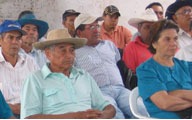
Strengthening local governance to reduce illicit activity
ACDI/VOCA’s Iniciativa Zona Norte (IZN) program worked to reduce social and economic illicit activity in eastern Paraguay. The USAID-funded initiative helped establish a new level of stability in the Canindeyú, Amambay, Concepción and San Pedro departments to reduce violence and criminal activity during Paraguay’s transition from de facto one-party rule to multiparty democracy. The program:
- strengthened local governance in at least 15 municipalities with technical and financial assistance so that local government can better respond to citizen priorities and improve service provision
- ensured economic security with licit and sustainable income-earning alternatives for campesinos (poor people living rural areas)
Community-Led Development
In order to strengthen local governance and enhance citizen participation, IZN implemented community-led initiatives that involved stakeholders in every facet of project planning and implementation. The program combined practical learning-by-doing experiences with formal training and technical assistance so that municipalities, working together with their constituencies, could address prioritized development needs and generate licit employment.
Economic Security
IZN employed ACDI/VOCA’s renowned market-driven value chain approach to map priority value chains and rapidly address constraints and limitations. The approach enabled producers and entrepreneurs to access promising markets and ultimately increase their licit incomes. Through medium- and short-term technical assistance, IZN helped identify and make immediate-impact upgrades to production, processing and marketing activities of selected value chains, with an eye towards quickly improving stakeholder incomes and empowering communities to stabilize the local economies and develop sustainable livelihoods in the transition to long-term development.
IZN benefitted 23,513 families through stabilization and livelihood development activities. Coverage of basic community-driven local services and infrastructure increased on average by 85 percent in communities receiving IZN assistance.





